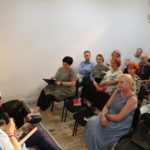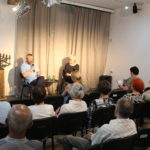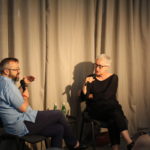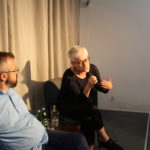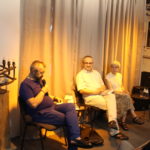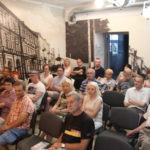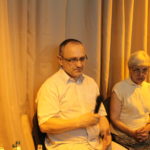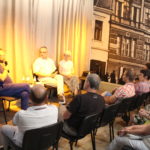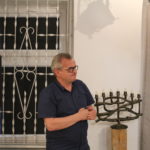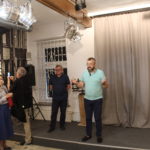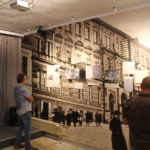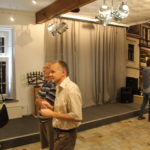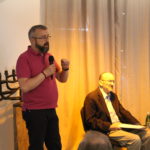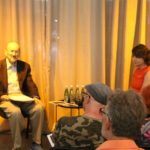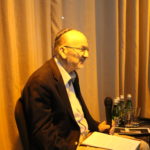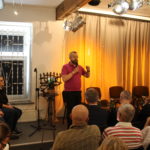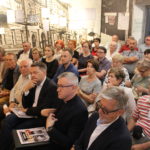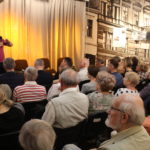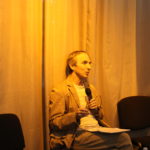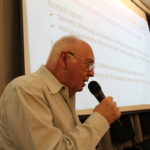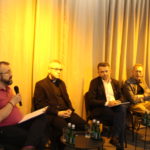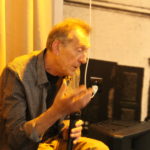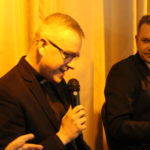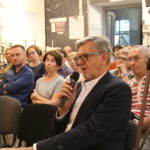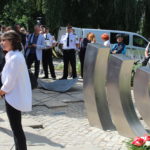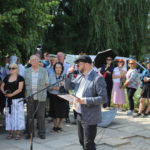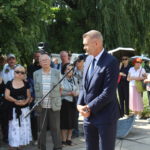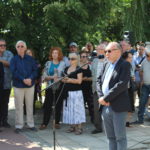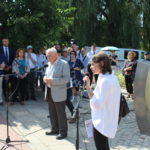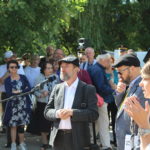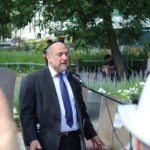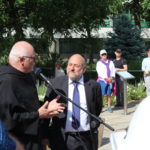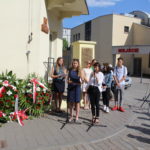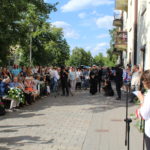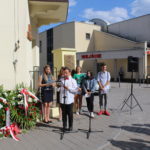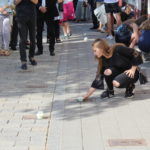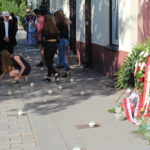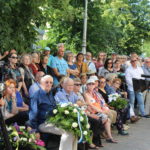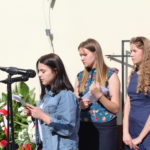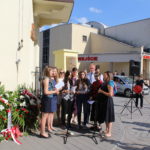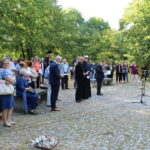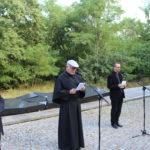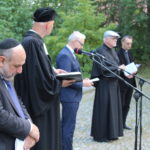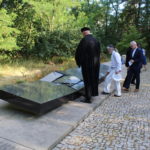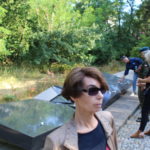This year’s celebration of the anniversary of the Kielce pogrom was preceded by two meetings related to new publications on the Holocaust. On June 18, 2019 we organized a meeting with Weronika Kostyrko on her latest book about Jan Karski’s wife (Polish title: “Tancerka i zagłada. Historia Poli Nireńskiej”). On June 26 we talked to a historian, Maciej Zaremba, and a publisher, Krystyna Bratkowska, about the book of Mordechaj Canin (Polish title: “Przez ruiny i zgliszcza” / Through Ruins and Rubble. A Journey Over 100 Ruined Kehiles in Poland), which is a recently published collection of accounts of journeys in post-war Poland following the past Jewish life. Kielce, which Canin visited shortly after the pogrom, is also included in the 100 ruined kehiles. The author recognizes the Kielce pogrom as the completion of the process of the total destruction of Jewish life initiated by the Nazis.
Between June 27 and 30 there were screenings of films about the pogrom organized at the Institute, including “Witnesses” by Marcel Lozinski and “Bogdan’s Journey” by L. Loewinegr and M. Jaskulski.
On July 1, 2019 a new permanent exhibition about the pogrom of November 11, 1918 was opened. According to Bogdan Białek, president of the Jan Karski Society, it is not possible to understand the pogrom of 1946 without taking into account what happened 28 years earlier. Both events were triggered by the same prejudice and mechanisms and the same people might have taken part in them. The exhibition presents documents which facilitate understanding of what happened in Kielce on the day when Poland regained independence. The exhibits include, among other, an anti-Semitic article which appeared the day before the pogrom on the first page of the magazine ‘Ojczyzna’ (Homeland) published in Kielce and an article from the Krakow’s newspaper ‘Nowy dzienik’ which covers a conversation between Kielce Jews describing those bloody events and the Chief of State, Józef Piłsudski. The exhibition can be visited on weekdays during the Institute’s business hours.
On July 2, rabbi Alan Iser, a lecturer at the Faculties of Theology at Villanova and St. Joseph’s universities in the USA, was our guest. He delivered a lecture on Jewish – Catholic relations in the USA after the declaration of Nostra Aetate. Our speaker talked about the changes in the relations under discussion introduced by this significant document and the areas of cooperation between Jews and Catholics. Moreover, Iser also discussed the fields where there is still no understanding between Catholics and Jews.
On the day before the pogrom we organized a meeting entitled “Night Conversations of Kielce People” devoted to the memory about the pogrom and its different forms. The meeting started with a lecture delivered by Professor Stanisław Obirek, a theologian, sociologist and historian of ideas, concerning how memory shapes societies today and how societies shape their memory often using it to justify their actions. Yaacov Kotlicki, president of the Kielzer Society in Israel, spoke about how the memory about the pogrom is still alive in Israel. The meeting ended with a panel discussion with Bogdan Białek, Rober Kotowki, director of the National Museum in Kielce, Rafał Dudała, chaplain of academic circles in Kielce and a researcher at the Institute of International Politics and Security, Jan Kochanowski University in Kielce, and Marek Cecuła, ceramic artist, designer of the Menorah monument in Kielce and a new gravestone of the pogrom victims. The discussion focused on the need for the memory about the pogrom and the most relevant forms of its expression.
The main celebration of the anniversary of the pogrom of July 4, 1946 included a March of Remembrance and Prayer. The ceremony began with official speeches at the Menorah monument, preceded by a song sung in Yiddish by the participants of music workshops organized by the Society. Bogdan Białek, president of the Jan Karski Society, expressed hope that the participation in the 20th March of Remembrance and Prayer was not directed against anyone but it was simply following our conscience. He said, “I believe in democracy, I believe in law and I believe in the rule of law. I know that one day they will work. However, what I cannot accept is a lie”. At the end of his speech, Białek called on the authorities of the Solidarity (Polish labour union) not to speak about the victims of the pogrom as “the victims of the Communist secret police” as it is a lie distorting the reality.
The new mayor of Kielce, Bogdan Wenta, participated in the celebration for the first time. In his speech he called for the celebration of the anniversary of the tragic events to unite people of Kielce. Michał Sobelman, representing the Israeli Embassy in Poland, said that Kielce which know how to face its past can shape its future in peace. The ceremony was attended by a large group of American educators, who visited Poland as part of a study tour organized by Classrooms Without Borders. Meryl Ainsaman, president of the Jewish Federation of Pittsburgh, where in October last year Jews praying at a synagogue were attacked and 11 of them were murdered, spoke on behalf of the guests. There were also moving speeches delivered by Joanna Sobolewska-Pyz, president of the Children of the Holocaust Association, who indicated that the victims of the pogrom were people who, like her, survived the war, and by Alina Świdowska from the Association of the Second Generation, who talked about her dream about Poland becoming a country without anti-Semitism. Włodzimierz Kac, president of the Jewish Religious Community in Katowice, stressed the tragic fact that no one from the Kielce Jewish Community could take part in the ceremony as because of the pogrom there is no such community in Kielce. The celebration at the menorah monument ended with a prayer of the Chief Rabbi of Poland, Michael Schudrich, and of Fr. Wiesław Dawidowski, representative of the Polish Episcopal Conference’s Committee for the Dialogue with Judaism.
Then, the participants of the march walked to the tenement house, where the pogrom took place, where the next part of the celebration was led by young people from Kielce. A short account of the tragedy of July 4, 1946, which was included as an inscription on the victims’ tomb, was read out in four languages, Polish, Hebrew, Yiddish and English. Further, a list of the victims’ names was read out and candles lit at stumbling stones with the names of thise murdered on July 4, 1946, placed in the pavement in front of the house. The participants of the celebration also listened to a letter which Bogdan Białek had received several days before the march, where an elderly woman told a story of her father-in-law who as a boy was saved from the pogrom by a militiaman leading him out of the mob pretending he was going to kill him. “This letter shows that the pogrom is not a story which finished in 1946, 1947 or 1948. It is a story which is still alive today and which influences the next generations”, said the president of the Jan Karski Society. The ceremony ended with a lullaby sung by young people in Yiddish.
The last part of the celebration included a prayer at the grave of the pogrom’s victims situated at the Jewish cemetery in Kielce district of Pakosz. The prayer was led by rabbi Schudrich, who recited Kaddish. Then, Catholic priests, Fr. Wiesław Dawidowski, Fr. Jacek Kopeć, who represented the Bishop of Kielce, Michał Jabłoński, pastor of the Evangelical Reformed Church in Warsaw, and Wojciech Ostrowski, pastor of the Evangelical-Methodist Church in Kielce, recited psalms. The celebration ended with a short message of Bogdan Wenta, mayor of Kielce, and special thanks expressed by Bogdan Białek.





